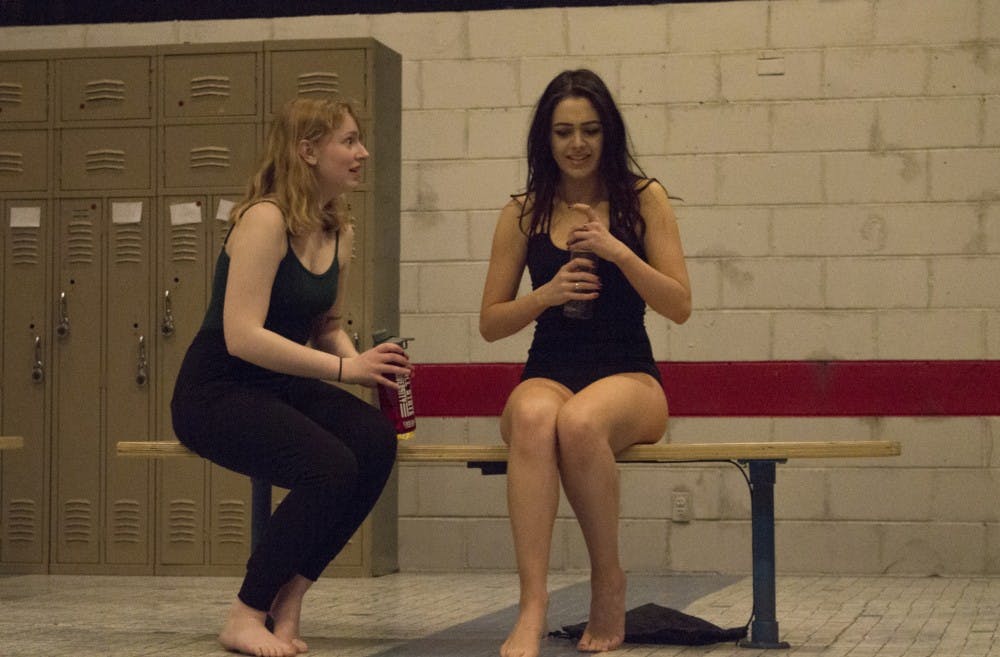In 90 minutes, the Department of Theatre and Dance will tell the coming-of-age story of two high school swimmers while raising questions about issues such as access to healthcare, sex education and abortion.
Strother Theater will host Ruby Rae Spiegal’s play “Dry Land” for two weekends with the first show at 7:30 p.m. Friday.
Set in a locker room in Florida, a state that has abstinence-only sex education, the play focuses on Amy, a pregnant 17-year-old swimmer, and Ester, the star of the swim team. Through the play, Amy decides that she wants to have an abortion, but struggles to take the proper means to do so, and she and Ester journey together to find alternatives and get through high school.
Both junior acting major Amber Overbay, who plays Amy, and freshman musical theater major Gracie Ording, who plays Ester, were surprised that they were casted as the leading roles in “Dry Land”.
For Overbay, she said she thought she “looked too old to play a high school character” as a junior, but Ording said she had “very little expectations” because of her current theatre experience.
Despite the actresses’ doubts, Jennifer Blackmer, the director of the show, knew the two girls would be perfect when she saw them reading the script together as Amy and Ester. Blackmer said she saw the vulnerability, openness and honesty between them that she was looking for between the two leading characters.
Overbay said this vulnerability onstage is something that challenges her, along with trying to separate herself from the work she does while staying connected with her character.
“It’s been hard trying to separate myself from Amy because you want to connect with your character, but also with this character, it’s a little too dark of a character to completely connect with all the time,” Overbay said. “I’m not like Amy in this situation, but I have to connect myself to the character and imagine what this would be like if I were 17 and going through this.”
Ording said even though audience members may not be able to connect directly to the situation the characters are in, everyone has been a teenager in high school going through tough situations.
“Something happened to you in high school that was the worst, and you didn’t know how to deal with it, and that’s what [Dry Land] is about at its core: dealing with the worst situation you could possibly be in,” Ording said.
Blackmer also added that rather than being a play solely about abortion, “Dry Land” is about education for young women.
“We as adults have to help them. We have to be willing to talk and be willing to educate,” Blackmer said. “This is a cautionary tale for me about what happens when we treat women as less than humans beings and when we’re afraid of their bodies. Hopefully, when people see the play it will make them think about our responsibility to the younger generation.”
The Department of Theatre and Dance has taken steps to ensure that the subject matter will be properly addressed throughout the play, including one scene that Blackmer said had a “simulated abortion on stage.”
“I think the experience of seeing the play is that it's an emotional journey for anybody who sees it because you have to ask yourself a lot of questions about the current climate particularly when it comes to young women and how we treat them, how we understand them, how they are human beings,” Blackmer said. “I want the audience to think about the young women in their lives and get a different perspective on what they’re up against as they try and grow up.”
While the play is political in nature as it deals with these issues, “Dry Land” does not take a moral stand on the issue of abortion. Instead, the play asks the audience to think about the questions surrounding the issue.
“It is an important message, no matter your beliefs, no matter your values, no matter how censored you like your media to be,” Ording said. “It’s not some Liberal or Conservative agenda being pushed upon the audience. It’s really just a portrayal of teenagers girls in a really awful situation.”
Additionally, the play does not give definite answers that these issues bring up, but Blackmer said the play’s ending offers “a great deal of hope” as the audience watch Amy and Ester grow and mature.
“I want audiences to be willing to think about some difficult things when they come and see [Dry Land] but also know that despite everything we go through, we’re all human and there’s nothing so bad that we go through that can’t be worked through and come out a stronger person on the other end.” Blackmer said.
Contact Nicole Thomas with comments at nrthomas3@bsu.edu.





